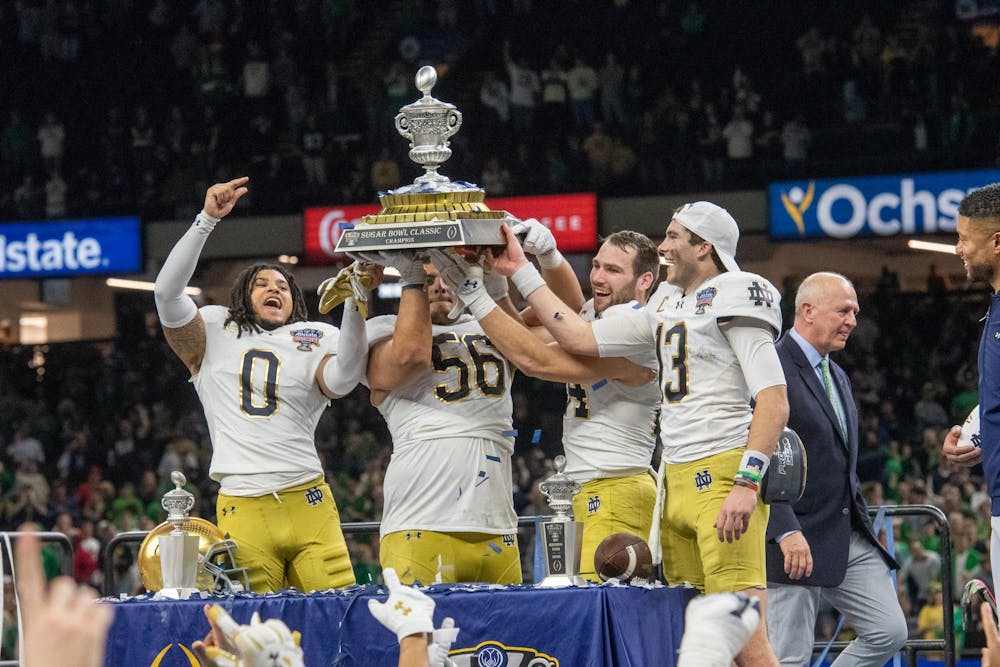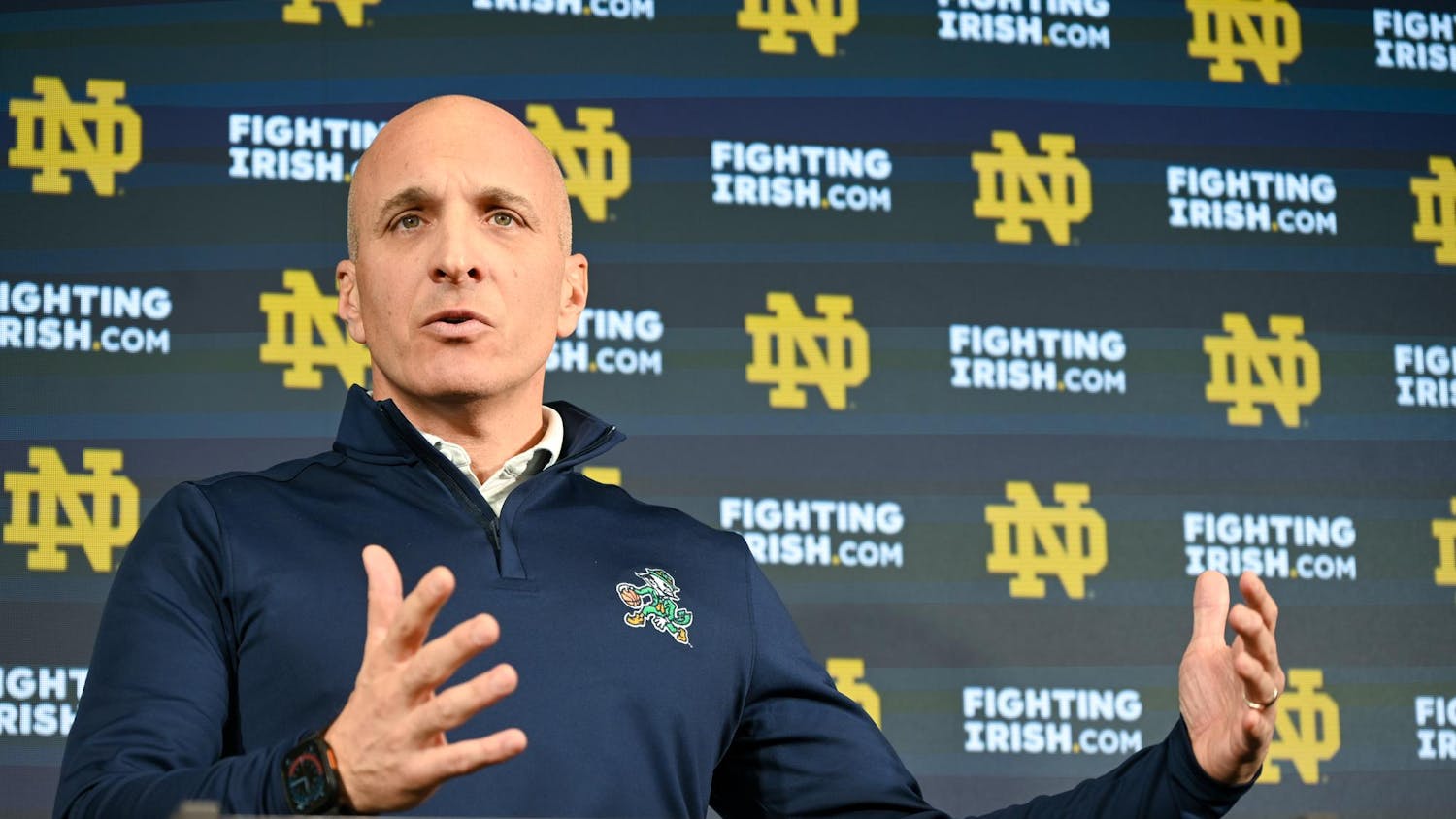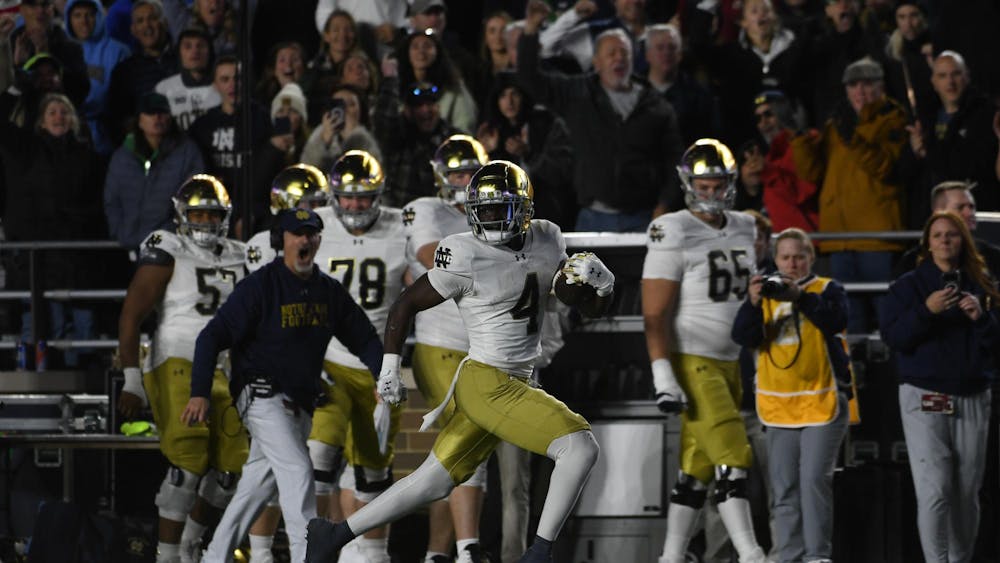Just less than four months ago, when Notre Dame football turned the page from the disastrous Northern Illinois loss to the longest active win streak in college football, chaos loomed large. Questions about extinguished postseason dreams and program legitimacy swirled, but the Irish didn’t need to waste time answering them. They just had to start winning.
Eleven straight games worth of winning brought Notre Dame down to New Orleans to ring in the New Year against Georgia in the Sugar Bowl. When the Irish landed in Louisiana on Sunday evening, they never could have imagined beating Georgia amid a state of emergency.
But that’s precisely how the week played out.
Wednesday morning’s attack on Bourbon Street left the team confused and emotional. The Sugar Bowl game received an unprecedented, 19-hour postponement. Rather than huddling as teammates on the Caesars Superdome turf on the night of New Year’s Day, Notre Dame’s players spent designated family time as sons and brothers.
Once again, this time in a much more human way, head coach Marcus Freeman and company sought stability as bedlam filled the Big Easy.
“[The players] had to still get ready for this game with the natural emotions that come into each individual that happened after the tragedy,” Freeman said. “I’m proud of the way they prepared. They stayed steady, and they went out and they did a great job.”
“There’s things in life that — they’re unpredictable. And the ability to handle those unpredictable things determines the success,” he added.
Once Thursday afternoon arrived, Notre Dame needed only one play to prove its readiness. To start a game contested predominantly at the line of scrimmage, junior linebacker Jaylen Sneed broke through and planted Georgia running back Trevor Etienne for a two-yard loss. The Irish and Bulldogs would combine to lose seven yards on their opening drives, and off went the fourth and final College Football Playoff semifinal.
Georgia, operating with backup quarterback Gunner Stockton at the helm for his first collegiate start, settled in on its second trip. Stockton dealt six straight completions, briskly moving the Bulldogs into the red zone. However, their first play inside the Irish 20 accomplished two of Marcus Freeman’s defensive keys to victory: stop the run and create takeaways. Etienne fumbled on a helmet-to-football hit by sophomore safety Adon Shuler, resulting in a recovery by sophomore linebacker Jaiden Ausberry, a Louisiana native.
As a scoreless first quarter gave way to the second, Notre Dame’s defense made another valuable stop deep in its own end. The Bulldogs opened drive three with a 67-yard passing strike that should have put it at the Irish 11, but an inactive Georgia player’s sideline interference penalty moved the play’s outcome back to the 26. Georgia’s offense hardly moved after that and settled for a field goal.
Engineered by a 32-yard jaunt by senior quarterback Riley Leonard, the Irish answered with a 44-yard kick on the ensuing drive. Then, with 39 seconds remaining in the first half, Jeter added a 48-yarder to put Notre Dame up 6-3.
Less than a minute of game time later, the Irish would have a 20-3 lead and the spark of RJ Oben to thank. Throughout the regular season, the graduate defensive end’s production in South Bend never matched the summer expectations attached to his name as he transferred from Duke. If Oben didn’t make amends with his strip-sack of Stockton on Notre Dame’s first play from scrimmage with the lead, he sure came close.
“No matter the role that’s determined for him, he puts everything into it,” Freeman said of Oben. “When you have the mindset and you have that work ethic, good things like what happened today happen to you.”
Leonard, a teammate of Oben’s at Duke and now at Notre Dame, used a Henry Ford quote to describe the edge rusher’s relentless work ethic and belief in himself: “Whether you think you can or can’t, you’re right.”
Inspired by Oben’s success and sensing vulnerability on the part of Georgia, Leonard put the very next play in the end zone. His fastball over the middle found graduate wideout Beaux Collins for his first and only catch of the game, a touchdown from 13 yards out that extended the Irish lead to 13-3.
Even with momentum squarely on his team’s side, Freeman made sure the Irish kept attacking. In his postgame press conference, he harped on remaining aggressive rather than merely surviving to start the second half.
Before that message could even pass through gold helmets and hit Irish ears, Notre Dame scored again. Another graduate transfer receiver, Jayden Harrison, ran the second half’s opening kickoff 98 yards to paydirt. The award-winning return man tallied the fourth kick return touchdown of his career by veering past a wave of tacklers at the 20 and following a convoy of teammates the rest of the way down the right sideline.
“I saw a white jersey in between red that whole time,” Harrison recalled, praising his blockers.
Though Georgia, a team known to overcome deficits, answered with a 32-yard passing score five minutes later, Notre Dame remained composed. The Irish, after falling short on a fourth-down attempt at midfield, hushed an intensifying Bulldog crowd with a fourth-down stop on the following defensive series.
The fourth quarter began with a 47-yard make from Jeter, who shined for a second straight postseason game after going on an injured, 1-for-5 field goal-kicking skid to end the regular season. Just like he did when Notre Dame scored 23 points to beat SEC opponent Texas A&M in August, Jeter went 3-for-3 with a trio of makes from 40-plus yards to help topple Georgia.
“If we expect to continue to move forward in the College Football Playoff, it’s gonna take all three phases,” Freeman said. “And we feel strongly about all three phases.”
All three phases would factor in once more to put the game on ice midway through the final quarter. First, with the Irish still up 13, graduate safety Rod Heard II broke up a Georgia pass bound for the end zone on fourth down. Then, after its offense went three-and-out, Notre Dame added to its list of special teams fakeouts. On fourth-and-1 at the Irish 18, the entire Notre Dame punting unit lined up, sprinted off the field and gave way to the offensive personnel. That forced Georgia to make a similar, but far less organized, substitution.
With zero time to think about a hard count from Leonard, Georgia’s defensive line jumped offside, resulting in an Irish first down. Only Notre Dame would move the chains inside its own 20 by deploying a line change fit for Compton Family Ice Arena.
“That’s gotta be one of our edges — that we are going to be an aggressive group and not fear making mistakes,” Freeman pointed out.
After two more Leonard rushing first downs drained the clock, Notre Dame’s defensive depth fittingly slammed the door. Junior defensive tackle Donovan Hinish, a second-stringer, sacked Stockton to set up victory formation on the other side of the ball. Down their four best players up front by the end of Thursday’s game, the Irish still wound up with four sacks and only 62 rushing yards allowed against Georgia.
“We’re not in this position unless everybody in this program gets their job done,” Freeman said. “I’m so proud of this program, the team, for the work they put in to obtain the result that we got tonight.”
Almost exactly a week after Freeman and Georgia head coach Kirby Smart shook hands to end the Sugar Bowl, Notre Dame will oppose Penn State in the Orange Bowl at 7:30 p.m. on Jan. 9 in Miami. The sixth-seeded Nittany Lions have beaten SMU at home and Boise State in the Fiesta Bowl to start their College Football Playoff run.









